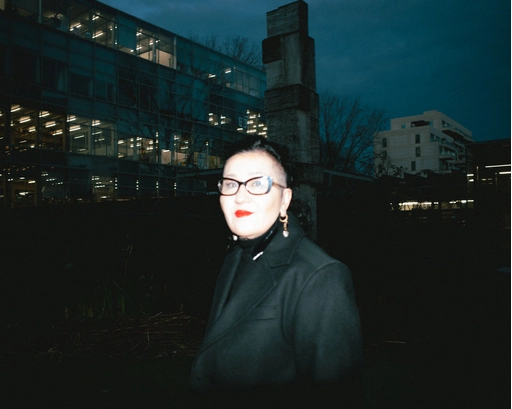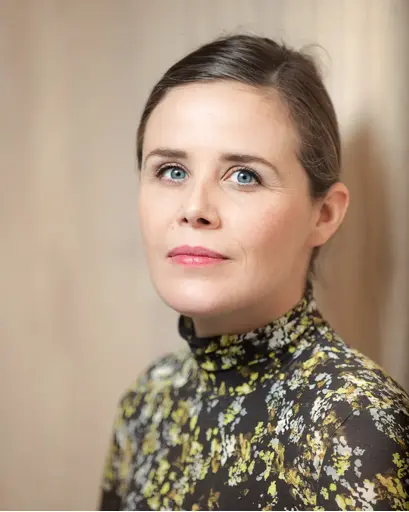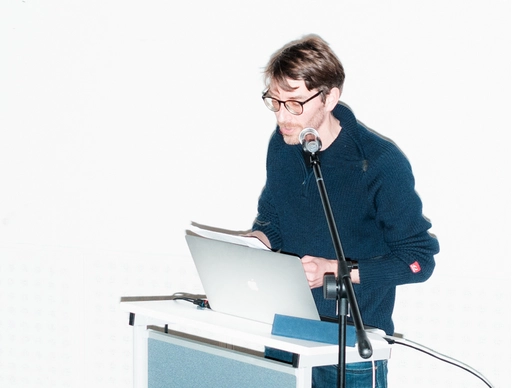event
13
Feb '25
A Research Seminar in Four Sessions with Femke Herregraven, Zachary Formwalt and Flavia Dzodan
A Research Seminar in Four Sessions with Femke Herregraven, Zachary Formwalt and Flavia Dzodan
The “Algorithmic Cultures” research group presents: Speculative Gaze: Reading the Algorithmic Image. In this seminar we will engage with the AI-generated image as a site for layered interpretation, inquiry, and cross-referential research. How do we see an image that isn’t solely of human origin? Each month, we will “read” three AI-generated images, analyzing their ambiguity and generative potential by linking them with theories, artworks, literature, film, sound, and more. Through this process, we ask: What networks of meaning arise from images crafted by algorithms? Session Dates are 16 January, 13 February, 13 March and 10 April. All sessions will take place from 5 pm to 7 pm in the Sandberg Auditorium on the 3rd floor of the BC building at the Gerrit Rietveld Academie. The seminar is open to everyone; students/alumni of Rietveld/Sandberg and people with an interest in research. Registration for the whole seminar or for individual sessions: eventix.shop/euxdgq4j
Seminar Objectives
This seminar seeks to reveal how algorithmic images, while seemingly “empty” of intentional meaning, can serve as starting points for artistic and theoretical exploration. Each researcher will bring their unique practices -whether theoretical, artistic, or rooted in other cultural form - demonstrating how images can drive research pathways rather than act as research endpoints.
Image as a Research Object
We approach the AI-generated image as an object that invites inquiry, a generative force rather than a conclusion. By placing each image in dialogue with external references, we locate hidden layers of meaning and highlight the potential of these images to act as catalysts for broader conceptual exploration.
Exploring Epistemic Frameworks
Each researcher brings an epistemic lens to their reading, contextualizing chosen frameworks and decoding the image through these approaches. We hope that this variety will enrich the seminar by showcasing the diverse ways meaning can emerge from a single image.
Dialogic and Comparative Interpretation
Our dialogic approach to interpretation emphasizes the relational nature of meaning-making. By juxtaposing the AI image with a chosen text, film, or artwork, we generate a dynamic conversation between different areas of knowledge, revealing how meaning shifts in context.
Embracing Ambiguity as Productive Force
We embrace the ambiguity inherent in algorithmic images, exploring how their resistance to fixed interpretation can lead to new theoretical insights and unanticipated connections.
Ethical and Aesthetic Implications
The seminar will touch on the ethical and aesthetic considerations in interpreting non-human creations. What does it mean to engage with images whose authorship belongs to an algorithm? We confront questions around agency, authorship, and the ethics of engaging with algorithmic works.
Comparative Analysis for Methodological Insight
By comparing different interpretative strategies, students will gain insight into how various lenses (whether theoretical, aesthetic, or cultural) shape the reading of an image. This comparative approach encourages students to reflect on their own interpretative preferences and the frameworks that resonate with their research practices.
Beyond Interpretation
This seminar is a space for shared inquiry, diverse methodologies, and interdisciplinary dialogue. Through our explorations, we hope to challenge traditional notions of intentionality, and what it means to engage with an image that resists human-centric meaning. In Speculative Gaze, we hope to create a collective, reflective space where algorithmic images are not only analyzed but are also seen as mirrors, reflecting back our own assumptions, insights, and speculative connections.
This seminar seeks to reveal how algorithmic images, while seemingly “empty” of intentional meaning, can serve as starting points for artistic and theoretical exploration. Each researcher will bring their unique practices -whether theoretical, artistic, or rooted in other cultural form - demonstrating how images can drive research pathways rather than act as research endpoints.
Image as a Research Object
We approach the AI-generated image as an object that invites inquiry, a generative force rather than a conclusion. By placing each image in dialogue with external references, we locate hidden layers of meaning and highlight the potential of these images to act as catalysts for broader conceptual exploration.
Exploring Epistemic Frameworks
Each researcher brings an epistemic lens to their reading, contextualizing chosen frameworks and decoding the image through these approaches. We hope that this variety will enrich the seminar by showcasing the diverse ways meaning can emerge from a single image.
Dialogic and Comparative Interpretation
Our dialogic approach to interpretation emphasizes the relational nature of meaning-making. By juxtaposing the AI image with a chosen text, film, or artwork, we generate a dynamic conversation between different areas of knowledge, revealing how meaning shifts in context.
Embracing Ambiguity as Productive Force
We embrace the ambiguity inherent in algorithmic images, exploring how their resistance to fixed interpretation can lead to new theoretical insights and unanticipated connections.
Ethical and Aesthetic Implications
The seminar will touch on the ethical and aesthetic considerations in interpreting non-human creations. What does it mean to engage with images whose authorship belongs to an algorithm? We confront questions around agency, authorship, and the ethics of engaging with algorithmic works.
Comparative Analysis for Methodological Insight
By comparing different interpretative strategies, students will gain insight into how various lenses (whether theoretical, aesthetic, or cultural) shape the reading of an image. This comparative approach encourages students to reflect on their own interpretative preferences and the frameworks that resonate with their research practices.
Beyond Interpretation
This seminar is a space for shared inquiry, diverse methodologies, and interdisciplinary dialogue. Through our explorations, we hope to challenge traditional notions of intentionality, and what it means to engage with an image that resists human-centric meaning. In Speculative Gaze, we hope to create a collective, reflective space where algorithmic images are not only analyzed but are also seen as mirrors, reflecting back our own assumptions, insights, and speculative connections.
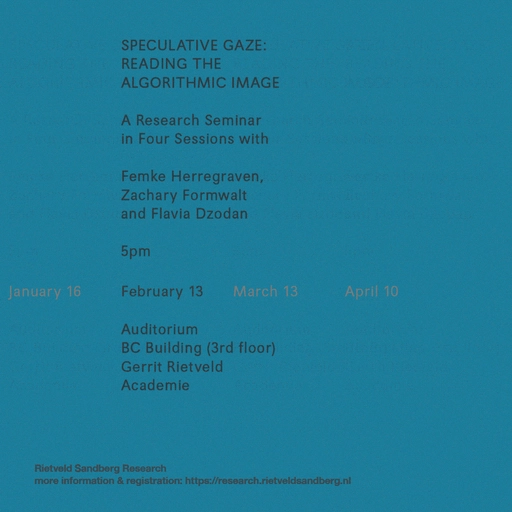
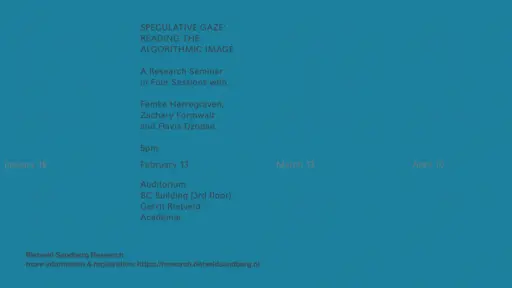
research group
Algorithmic Cultures
Algorithmic Cultures
